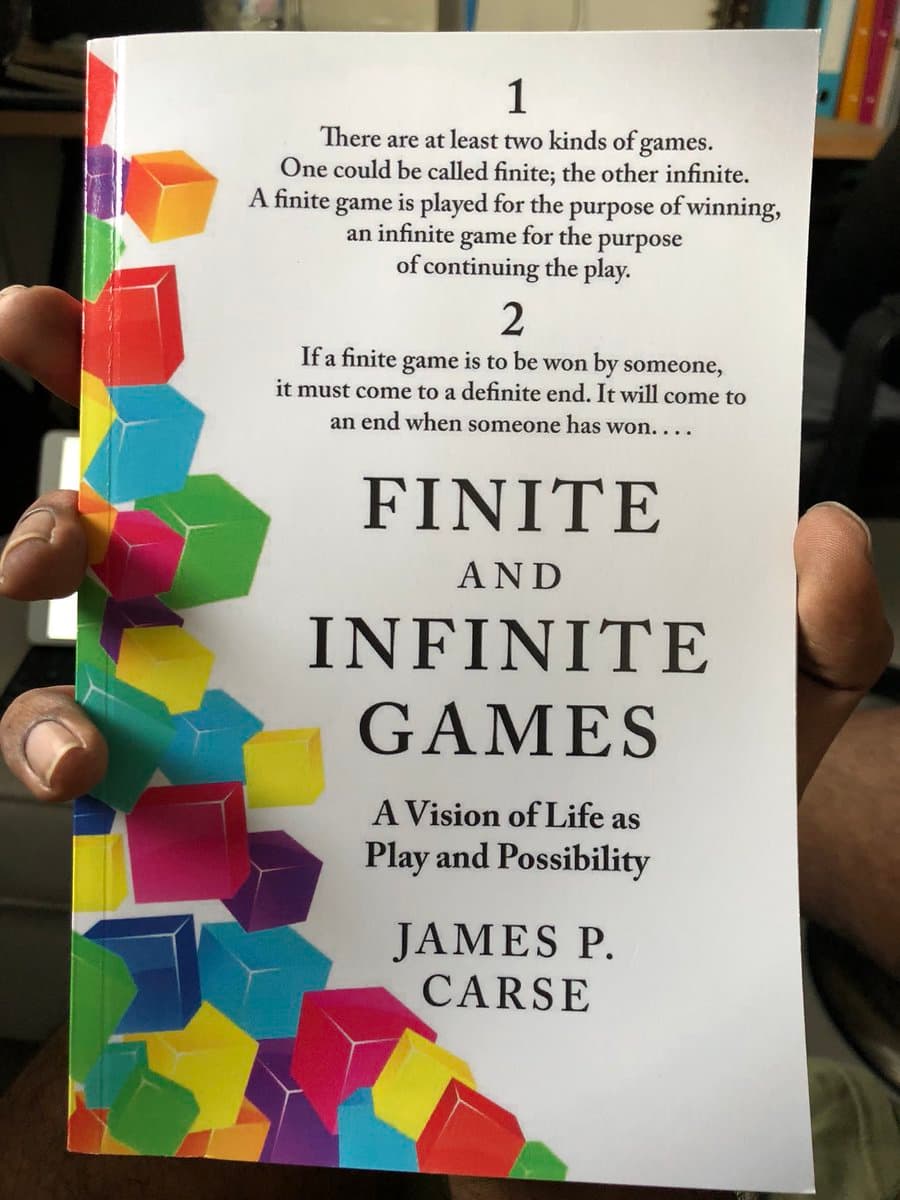🧵 View Thread
🧵 Thread (24 tweets)

#nowreading Finite and Infinite Games by James P. Carse. Been kind of avoiding it because I feel like I already get the idea + all the meta-rationalbros love it. But it seems short and I got time so why not https://t.co/wesqt3HNmI


2 types of games: play to win, play to keep playing. “It’s an invariable principle of all play, finite and infinite, that whoever plays, plays freely. Whoever *must* play, cannot *play*.” 🤔🤔 intuitively, “forced play” is obviously not true play. But what does “must” mean?

“When unnecessary/excessive damage is inflicted by one side in warfare, a question arises as to the legitimacy of the victory that side may claim” - ok this is interesting, we’re talking about social conceptualizations of “playing by the rules”

In order for people to agree on a winner, it needs to be clear what the game is and who the participants are. If people can join and leave the field as they wish, the resulting confusion obfuscates any possibility of clear victory. “Who, for example, won the French Revolution?”

No one is forced to remain a lawyer or a rodeo performer, but one senses a compulsion to maintain a certain level of performance - because permission to play in these games can be cancelled. We cannot do whatever we please and be X, yet we could not be X unless we pleased

Consider the elaborate, wonderful game of theatre - the actor keeps her own person distinct from the role. And yet she’s aware that she’s acting. We the audience are in complicity with her mask. We allow her performed emotions to move us, but we don’t forget that she’s an actor

So it is with all roles. Only freely can one step into the role of Mother. But those who assume this role (typically) suspend their freedom with a proper seriousness. A mother’s words, actions, feelings belong to the role, not the person...

... although some persons veil themselves so assiduously that they make their performance “believable even to themselves”, conflating their role and their person. [Some of us choose to identify as our masks and roles entirely, and some don’t even recognise that this is a choice]

No finite play is possible without some self-veiling. The issue is whether we are ever willing to drop the veil and openly acknowledge, if only to ourselves, that we have freely chosen to face the world through a mask. [imho, the face behind the veil is mostly another mask]

When the actress leaves the stage, in a sense she leaves one role for another, the role of “actress” - an abstracted personage whose public behaviour is carefully scripted and produced [Yes! Scripts aren’t inherently bad; they are unavoidable. The challenge is to be interesting]

Self-veiling is a contradictory act: a free suspension of our freedom. I may have used the veil so successfully that I have made my performance believable to myself. But credibility does not undo the contradiction of self-veiling.

If no amount of veiling can conceal the veiling itself, the question is... how far will we go in our seriousness at self-veiling, and how far will we go to have others to act in complicity with us? https://t.co/DHSG3CDQW6


“Since finite games can be played within an infinite game, infinite players don’t eschew the performed roles of finite play. Rather, infinite players enter into finite games with the appropriate energy and self-veiling - but they do so without the seriousness of finite players.” https://t.co/q679rKUW5A


“They freely use masks in their social engagements, but not without acknowledging to themselves and others that they are masked.” ^ me every time I resist the urge to respond to a baby announcement with “congrats on your successful insemination!!” https://t.co/oHoj7meeSU


To be playful is not to be trivial or frivolous, or to act as though nothing of consequence will happen. Rather - when we are playful, we relate to each other as free persons - and the relationship is open to surprise. Seriousness = pressing for a specific conclusion. https://t.co/OAyhqyy4Yh


Worth mentioning: there IS also a form of playfulness associated with situations protected from consequence- whatever we do, nothing will come of it. This is “playing at”, harmless fooling around, disregard for social constraint [imo this = playfulness of the privileged] https://t.co/OU0qNXWK2L


Finite players desire to be masters of their domain, to be perfectly skilled, to know and foresee every possible move. They don’t like being surprised (caught off-guard) Infinite players desire novelty & the unknown. They love surprise, expect to be amused & transformed by it https://t.co/AEzMrSTgEG


Finite players play for immortality (Hall Of Fame) while infinite players play as mortals. Death for finite players is a sort of defeat, death for infinite players is a sort of joke (in this elevated sense where joke =/= frivolous or dismissive, but somehow enriching, joyous) https://t.co/ZzbbihQOSy


"that does not mean we are to be perpetually solemn. we must play. but our merriment must be of the kind which exists between people who have, from the outset, taken each other seriously" https://t.co/kOMD9fbM4e